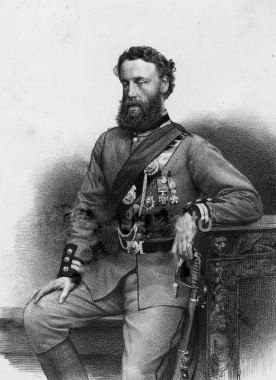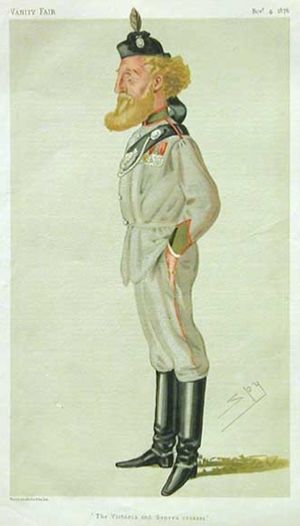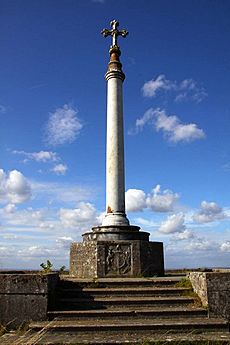Robert Loyd-Lindsay, 1st Baron Wantage facts for kids
Quick facts for kids
The Lord Wantage
|
|
|---|---|

Robert Loyd-Lindsay c.1882
|
|
| Born | 17 April 1832 Berkeley Street, Mary-le-bone |
| Died | 10 June 1901 (aged 69) Wantage, Berkshire |
| Buried |
Ardington Church (Vault)
|
| Allegiance | United Kingdom |
| Service/ |
British Army |
| Rank | Brigadier General |
| Unit | 1st Battalion, Scots (Fusilier) Guards Honourable Artillery Company Home Counties Brigade 1st Volunteer Battalion, Princess Charlotte of Wales's (Royal Berkshire Regiment) |
| Battles/wars | Crimean War Franco-Prussian War (Red Cross) |
| Awards | Victoria Cross Knight Commander of the Order of the Bath Volunteer Officers' Decoration Commander of the Legion of Honour (France) Knight of the Order of the Medjidie (Ottoman Empire) Order of the Crown, 3rd Class with Cross of Geneva (Prussia) Crimea Medal with 4 clasps Turkish Crimea Medal Queen Victoria Diamond Jubilee Medal |
| Spouse(s) | Harriet Jones-Loyd |
| Other work | Member of Parliament for Berkshire Financial Secretary to the War Office Lord Lieutenant of Berkshire |
Brigadier General Robert James Loyd-Lindsay, 1st Baron Wantage (born April 17, 1832 – died June 10, 1901) was a British soldier and politician. He was also a kind person who gave a lot to others. He helped the town of Wantage and was the first chairman and co-founder of the British National Society for Aid to the Sick and Wounded in War. This group later became the British Red Cross. He even got Queen Victoria to support it.
Contents
Early Life and Family
Robert Loyd-Lindsay was born in 1832. His father was Lieutenant General Sir James Lindsay. In 1858, Robert married Harriet Sarah Jones-Loyd. She was the only child of a very rich man, Samuel Jones-Loyd. As a wedding gift, her father gave the couple a lot of money and the Lockinge Estate near Wantage. After their marriage, they were known as Loyd-Lindsay.
Military Service and Bravery
Robert Loyd-Lindsay was a captain in the Scots (Fusilier) Guards. He fought in the Crimean War. He was given the Victoria Cross for his brave actions. This is a very high award for bravery in the British military.
His Actions in Battle
He earned his Victoria Cross for what he did on September 20, 1854, at the Battle of the Alma. He also showed great courage on November 5 at the Battle of Inkerman.
The London Gazette, a famous official newspaper, described his actions:
When the soldiers were confused at Alma, Captain Lindsay stayed strong with the flag. His example helped bring order back. At Inkerman, at a very difficult time, he and a few men charged a group of Russians. He drove them back and even fought one himself.
After the Crimean War
In 1858, Robert Loyd-Lindsay became an Equerry to The Prince of Wales. An equerry is an officer who serves a royal person. He left this role in 1859 because he was getting married.
Later, he was involved in the volunteer movement. He became a Colonel and then a Brigadier-General. He was one of the first people to receive the Volunteer Officers' Decoration. He also led the Honourable Artillery Company for many years.
Political Career
Robert Loyd-Lindsay was a Conservative Party Member of Parliament for Berkshire. He served from 1865 to 1885. He also worked for the government as the Financial Secretary to the War Office from 1877 to 1880.
In 1881, he was made a Knight Commander of the Order of the Bath. This is a special honor. In 1885, he was given the title Baron Wantage. This meant he became a Lord. He then served as the Lord Lieutenant of Berkshire from 1886 until he died.
Founding the British Red Cross
A New Society for Aid
On July 15, 1870, the Franco-Prussian War started. This war made people realize that there was a need to help sick and wounded soldiers. John Furley asked Robert Loyd-Lindsay to help create a British Red Cross society in the United Kingdom.
Loyd-Lindsay strongly supported the idea. On July 22, he wrote a letter in The Times newspaper. He asked for a national society in the UK and promised to give £1000 of his own money.
The First Meeting
On August 4, he led a public meeting in London. At this meeting, they decided to form "a National Society... for aiding sick and wounded soldiers in time of war." They agreed that this society would follow the rules of the Geneva Conventions. These are international rules for how to treat people in war.
Loyd-Lindsay continued to be the chairman of this new group. It was first called the National Society for Aid to the Sick and Wounded in War. In 1905, it was renamed the British Red Cross. He led the group until his death.
Helping Wantage
Lord Wantage was known for being very generous. He gave many donations to the town of Wantage, which was close to his home.
Gifts to the Town
- In 1877, he paid for a marble statue of King Alfred. This statue still stands in Wantage market place today.
- He also gave the Victoria Cross Gallery to the town. This gallery had paintings that showed the brave actions of soldiers who received the Victoria Cross, including his own.
Connection to Abingdon School
Lord Wantage had a close relationship with Abingdon School. He was on the school's governing body until he died. He gave money to the school and often presented prizes at events. Even after his death, his wife, Lady Wantage, continued to support the school. Today, a room at the school is still named after Lord Wantage.
Later Life and Legacy
Lord and Lady Wantage lived at Lockinge House in Berkshire. Robert Loyd-Lindsay died on June 10, 1901, when he was 69 years old.
Florence Nightingale, a close friend, wrote about him after he died:
Lord Wantage is a great loss but he had been a great gain. He worked very hard for others and for the common good. His life made a big difference for everyone. All are better because he lived, and this good will last forever.
Lady Wantage built a monument to Lord Wantage on the Ridgeway. It has special words written on it in Latin. These words mean: "Peace in passing away. Salvation after death. Light after darkness. Hope in light."
Lord Wantage did not have any children, so his title ended when he died. In 1908, Lady Wantage opened Wantage Hall at the University of Reading. She did this to honor her husband. Lady Wantage died in August 1920.
Images for kids
 | Aaron Henry |
 | T. R. M. Howard |
 | Jesse Jackson |






